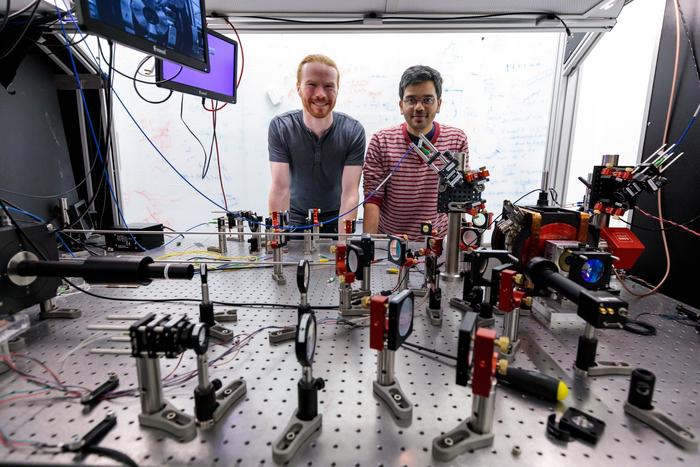Shortly after my latest book, Quantum Boost,” Using Quantum Computing to Supercharge Your Business.” was published, I started to receive invitations to podcasts, interviews, meetings, and panels to discuss anecdotes from the book. It fascinates me how interviewers refer to the stories the book generates, even in the short time since its release in May 2021. What are people talking about? What are the most frequent questions you get? Did anything surprise you about the book’s reception? I’m always happy to share these stories and equally interested in what people have yet to ask.
The overarching theme of these questions and resulting stories is where this relatively new technology (being the figurative ‘rubber’) meets the road. Or, more specifically, when will it be practical for our use? This week, I enjoyed observing a session that affirmed what many major companies in this industry recognize; practical quantum use (getting out of the laboratory) is becoming increasingly important. The role of quantum engineering is a crucial pillar of that progress.
What is Quantum Engineering?
Definitions are often fluid when it comes to technology. From the University of Bristol (UB), one description states, “Quantum engineering is a revolutionary approach to quantum technology…A quantum engineer will understand how to use the tools and language from quantum mechanics, electrical and electronic engineering, systems engineering, and computer science as well as other physical sciences.” A tall order for one individual. Yet global citizens looking to the future of technology should consider both the struggle to get there and the opportunities once they have arrived.
Engineers Potential Impact
Quantum technology will touch on climate issues, pharmaceutical research, traffic, portfolio, supply chain optimization challenges, and even vehicle paint selection. Volkswagen was one of the first to use quantum computing to minimize the number of base coat swaps when painting cars. There is endless creativity from researchers and opportunities for quantum engineers to implement such innovations.
MIT’s new Center for Quantum Engineering (QCE) strives to help define the discipline of quantum engineering. In conjunction with the MIT Industrial Liaison Program (ILP), CQE hosted “Quantum Opportunities and Challenges: 2021”, including representatives from Google’s Quantum AI Group, BMW, Zapata Computing, Keysight Technologies, and the US National Quantum Coordination Office. To be sure, the content included a brief description of quantum technology. Yet, the bulk of the session focused on practical examples, issues, and opportunities driven by quantum engineering.

MIT’s collaboration with BMW and Zapata Computing on supply chain optimization could be associated with and applied to any industry. Complex problems incorporating multitudes of options and factors, requiring computer systems that can do what traditional computers cannot (especially if the latter would take thousands of years to compute). A growing number of people like me in quantum technology (computing, sensing, etc.) focus on strategy, talent, and business acumen. The same group is most interested in the viability (scaling, accuracy, flexibility, cost, hybrid-enabled) of quantum solutions. MIT’s session, was hosted by recognized quantum expert and professor Will Oliver, hit the mark.
Frequent Questions
When I speak to experts and enthusiasts, today’s questions and resulting stories fall into three main categories: hype, practicality, and technology vs. business acumen—all highly relevant to the quantum engineer. Let’s start with hype.
Hype vs. Reality
When I answer a question about hype in the quantum world, I share the Gartner Hype Cycle; the amount of money invested both publicly and privately, and the difference experienced with AI’ winters’. The rapidity of new quantum developments exacerbates those factors. It’s a complex response (Christopher Savoie of Zapata Computing correctly refers to this as ‘nuanced’).
If you’ve been reading the mainstream or industry media, you’ve heard about large quantum companies’ own roadmaps. IBM, Honeywell, and Google have shared their roadmaps to set their own goalposts, keep their employees motivated, and engage their potential clients. Yet none of these have suggested the ultimate quantum computer (often referred to as ‘universal fault tolerant’) is near. Industry participants’ expectation setting is crucial to advance leveraging of this relatively immature technology. Such expectation setting will be a vital responsibility of quantum engineers to remind relevant parties of Amara’s (or Gates’) Law that as humans, we “overestimate the impact of technology in the short-term and underestimate the effect in the long run.” As a strategist in the artificial intelligence and quantum worlds, quantum appears to be moving much faster than AI did. The quantum adoption curve will accelerate. Regardless, the industry must set realistic expectations (not hype).
Whenever I discuss quantum hype, I always conclude the same way. Whether you believe in the hype or not, there are practical quantum applications in the market today. As a business leader or professional, the important thing is that you must start. Start to learn about quantum computing, its foundations, its opportunities, and start including it in your company’s roadmap, even if you don’t invest a dollar this year.
Practical Applications
The next question I get asked about is whether quantum is truly a practical technology. There is no shortage of examples in the market today. Samsung/IDQ’s quantum random number generator chip inside the new Galaxy smartphone; quantum key distribution technology over fibre optic cable in China providing hundreds of kilometers of secure communications; portfolio optimization and cryptography at JP Morgan Chase. The list goes on. Indeed, some industries like finance, municipal road traffic, and computer security lead the way. Still, more and more applications are developed as the quantum user developer community grows along with the technology’s acceptance and adoption.
Zapata Computing CEO, Christopher Savoie, is in my opinion, a renaissance man who has an incredible panoramic view of quantum’s business and technical perspectives. Within the MIT CQE session, Savoie offered a brief look into quantum optimization use cases, for example, both industry-specific and across industries.
Within Industries
Applications within finance and insurance industries include portfolio management, asset pricing, and regulatory optimization (as a former banker, this one resonated with me). Design process optimization was cited in manufacturing, considering the complex variety of factors, including people, equipment, facilities, temperature, materials, customer requirements, and budget. Those familiar with the travelling salesperson problem and the number of cities understand this dynamic. Life sciences and health examples include molecular structure, protein design, and resource allocation. Energy and utilities must consider the time of day, energy sources, sharing, equipment efficiency, failures, rerouting, and a myriad of other factors to optimize energy generation, delivery, and consumption.
Across Industries
‘Across Industries’ functions like marketing, supply chain, logistics, infrastructure, and operations can benefit from quantum optimization. Marketing? Really? Absolutely. With the personalization of marketing offerings, optimizing advertising becomes highly focused on a target of one or rather 7.8 billion ‘ones.’ For a greener planet, optimizing transportation routes for the supply chain becomes more achievable through quantum computing. Finally, workflow and network activities fall into the quantum optimization realm.
Are there practical applications of quantum technology? I hope I’ve proved that case to be true.
Technology vs. Business Acumen
The most successful engineers I’ve encountered have an additional element in their portfolio not mentioned within the UB definition. Business acumen. They look beyond the technology to the likelihood they’ll be employed again because of adherence to a client’s budget, timeline, and scope as a priority.
I’m often asked does one need to be a Ph.D. in quantum physics or mechanics to be credible working in this industry? The answer is a definite NO. The quantum industry has done a reasonable job of recruiting and upskilling technical minds. Yet, consistently, leaders and experts tell me they need resources with business acumen to pitch the technology, understand regulations, set up the infrastructure, pull teams together, manage communications, and many other functions associated with quantum success. It’s always wise to learn the core of a technology, and learning resources are plentiful in 2021. Business leaders tell me they can teach the technology but need to find and retain the business experience. Quantum engineers need both.
What People Have Yet to Ask About
When I mentioned I was surprised about certain things after publishing the book, it’s often the questions I don’t get asked. It may be that I have a bias after writing a book that covers a wide variety of topics. Or unrealistic expectations. But two areas have yet to make it to the mainstream quantum conversation – convergence and ethics.
Convergence
In 2021, there are at least ten modalities of quantum computer either on the market or being in development. They are superconducting, annealing, ion trap, photonic, quantum dot, nitrogen-vacancy diamond, neutral atoms, topological, quantum analog, and a variation called digital annealing. So, at this juncture, we’re nowhere near a convergence which is hardly surprising given the immaturity of quantum technology. Yet, if you’re a potential client, how are you making a reasoned, well-informed choice between these options? It’s a long conversation but well worth the trouble.
MIT’s Will Oliver measures quantum modalities on the scales of gate speed (in Hz), gate fidelity (percentage accuracy), and a number of gates before error. Based on these three measures, in 2021, superconducting qubits and trapped ions modalities lead, though some other quantum computer modalities are meant for highly specialized functions. Overall, most quantum modalities are making progress towards better performance, and it remains to be seen if convergence will occur sooner than later.
Ethics
In the world of artificial intelligence, ethics, privacy, and responsibility have become watchwords in the last five years. With its’ General Data Protection Regulation introduced in 2016, Europe focused squarely on the consumer and the challenges of entities collecting data about them without consent and under reasonable circumstances.
Introducing technology with the power of quantum could escalate some countries or companies well beyond competitors. Today, there are examples where militaries are using hybrid solvers (combinations of traditional and quantum computing) for battlefield simulations. Other cases where hyper-accurate predictions (encompassing vast increases in data) are calculated significantly faster than in the past. Quantum cryptography has the potential to surpass RSA type (public-key cryptosystems) security in the next decade. Who gets the advantage and what do they do with that advantage will part of the quantum ethics, privacy, and responsibility discussion going forward?
Conclusion
Personally, I loved writing Quantum Boost. Researching global activities, gaining a greater understanding of how the technology works, determining which vendors and universities were at the forefront were all fascinating aspects of the process. Yet, it was the stories that experts and enthusiasts told me in interviews and casual conversation that made the quantum ecosystem a reality. It generally comes down to people. And people love to ask questions. And engineers love solving them, right at the junction where qubits will meet the road.
For more market insights, check out our latest quantum computing news here.
LINKS
Email: [email protected]
Aquitaine Innovation Advisors: www.aquitaineinnovationadvisors.com
LinkedIn: https://www.linkedin.com/in/brian-lenahan-innovation/




















